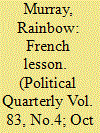| Srl | Item |
| 1 |
ID:
118227


|
|
|
|
|
| Publication |
2012.
|
| Summary/Abstract |
France and the UK both have parliaments with one MP per constituency. This electoral system is known not to be conducive to women's representation, and both countries have struggled with low proportions of women in parliament. France's response was to introduce a gender parity law in 2000. Since then, the number of women in the French parliament has almost doubled, but still remains low by European standards and is far from parity. This article considers what the UK can learn from the French experience. In particular, it considers how gender quotas emerged onto the agenda in France, why they were set at 50% and how effective this was, how they were implemented, and why they have not been more successful. The article does not recommend following in France's footsteps, but the UK can take inspiration from France's successes and seek to avoid repeating her mistakes.
|
|
|
|
|
|
|
|
|
|
|
|
|
|
|
|
| 2 |
ID:
133934


|
|
|
|
|
| Publication |
2014.
|
| Summary/Abstract |
Gender quotas traditionally focus on the underrepresentation of women. Conceiving of quotas in this way perpetuates the status of men as the norm and women as the "other." Women are subject to heavy scrutiny of their qualifications and competence, whereas men's credentials go unchallenged. This article calls for a normative shift in the problem of overrepresentation, arguing that the quality of representation is negatively affected by having too large a group drawn from too narrow a talent pool. Curbing overrepresentation through ceiling quotas for men offers three core benefits. First, it promotes meritocracy by ensuring the proper scrutiny of politicians of both sexes. Second, it provides an impetus for improving the criteria used to select and evaluate politicians. Third, neutralizing the overly masculinized environment within parliaments might facilitate better substantive and symbolic representation of both men and women. All citizens would benefit from these measures to increase the quality of representation.
|
|
|
|
|
|
|
|
|
|
|
|
|
|
|
|